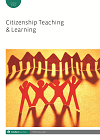
Full text loading...
 , Eric King-Man Chong1
, Eric King-Man Chong1 , Wing Tat Leung1
, Wing Tat Leung1 , Yan Wing Leung1
, Yan Wing Leung1
When experiential learning emphasizes student participation and voice, experiential learning can be an effective form of political socialization to facilitate learning processes by enhancing knowledge construction and developing civic competency. Employing qualitative research, this study examined how meaningful and significant experiential learning could not only allow students to co-construct the meaning of citizenship but also contribute to civic development and further participation. The results revealed that teachers stressed civic engagement as an important attitude of ‘good citizens’ which could have affected how they viewed and organized learning activities (such as experiential learning) for their students. Experiential learning that provided space for student participation and voice helped nurture students to become ‘good citizens’ and contributed to students’ further civic engagement despite many challenges. The findings of this study suggest that governments need to rethink their policies on integrating youth engagement to accommodate the voices and interests of young people and expand on theories of citizenship and highlights cultivating active participation as important aims of civic education.

Article metrics loading...

Full text loading...
References


Data & Media loading...

Publication Date:
https://doi.org/10.1386/ctl_00091_1 Published content will be available immediately after check-out or when it is released in case of a pre-order. Please make sure to be logged in to see all available purchase options.